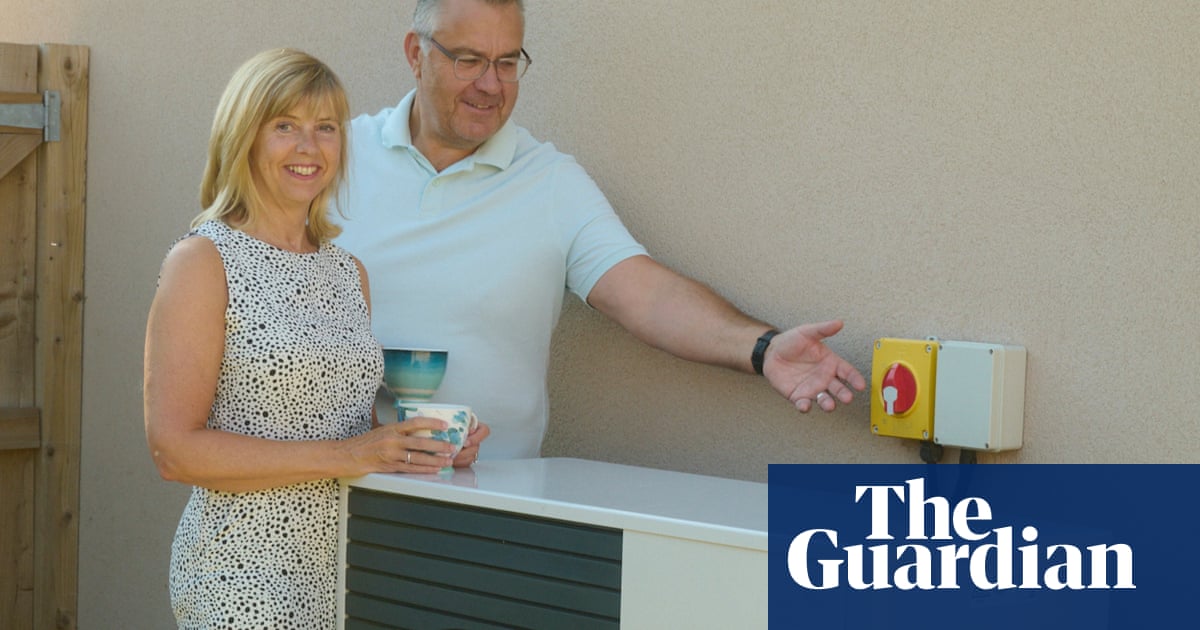This Monday, it will be two years since Julian and Juliette Rayner moved into their new zero-carbon home on a development about 20 minutes drive from Bristol.
The property boasts a range of new technologies that makes it highly energy-efficient and enable the couple to generate their own electricity and live a greener lifestyle.
Instead of the traditional gas boiler that so many people rely on for their heating and hot water, thereâs an air source heat pump fitted to one of the outside walls, plus extensive solar panels, underfloor heating, an electric vehicle charging point and high levels of insulation. The Rayners also bought a battery for electricity storage.
Even though they were aware of the impact insulation and an energy-efficient boiler could have on their bills, moving to a green home had not been top of the coupleâs wish list. But the more research they did into the benefits that a zero-carbon home could deliver, the more they liked the sound of it, so they took the plunge and bought one of the developmentâs 32 properties.
They soon found that their energy bills plummeted, and they effectively pay as little as 50p to £1 a week to power their home â ie, all their hot water, cooking and heating needs â in the warmer months, when they are able to generate most of their power via the solar panels. In fact, in June this year they were £12 in credit.
During the winter, when they have to rely on the National Grid, they might spend more like £33 a week, or £150 a month.
âWeâve lived in much older properties in the past and know how much they cost to heat â and itâs a lot,â says Juliette.
So, two years after moving in, how are they finding their home and its green features â in particular, the heat pump?
âIn a way, we donât really think about our heating or energy bills any more, which I suppose is what you want, really,â says Julian.
âItâs definitely been an education, as it needs a bit of a behavioural shift if these are going to be the homes of the future. Neither us nor our neighbours knew much about heat pumps and solar panels before we moved here, but itâs been good in that weâve all been in it together and finding our way as we go.â
Thankfully, their experience over the past two years has been positive. âItâs quite a change from a gas boiler. For instance, if you were to switch off the heating completely and itâs cooled right down, it can take longer to warm up than it would have done when we were using gas,â says Julian.
âHowever, this shouldnât be seen as a negative. Instead, it means we get a more comfortable, consistent temperature all the time â rather than feeling cold and having to crank the heating up, like we used to when we had a boiler. Itâs easier now, because we donât have to think about times to turn it on and off. Itâs just there and does its own thing responsively.â
The couple have also had friends and family ask about their heat pump, and how they find it.
âI knew what it was going to look like â a bit like an air conditioning unit at an office. Itâs a square box, probably about 4ft long, 3ft wide and 1ft deep, with a big fan in the middle,â says Julian.
He adds: âPeople do ask the things you often see in the media â such as if theyâre noisy. But once youâve seen it working, you realise that itâs actually really quiet ⦠You can sit outside and have a barbecue and youâre not even hearing it, and youâre about 4ft away from it.
âIt lays to rest a lot of the misconceptions you often hear, or things people have picked up that arenât necessarily true.â
The couple have been delighted about the savings they have enjoyed on their energy bills (though those figures quoted above donât include the standing charge).
âWe canât all be expected to completely overhaul our lives when it comes to being greener, we have to be realistic. But we want to do what we can, and this house really makes us feel like weâre doing our bit to help,â says Juliette.
According to Tim Bannister, Rightmoveâs property expert, searches for terms such as âsolar panelsâ and âheat pumpsâ on its site have risen dramatically since 2020 â from outside the top 500 to within the top 100 for the panels, and into the top 200 from above 1,000th place for the pumps.
âTheyâre not top of buyersâ must-haves just yet, and more work is needed to raise awareness of the benefits, but we expect to see more of a focus on these types of features as the nation moves towards greener homes,â he says.



